Copied to Clipboard
Ready to get Started?


Key Takeaways
As your business grows, ensure your HR software can evolve with your team, supporting new needs such as expanded hiring, benefits, and performance management.
A platform’s ease of use, intuitive design, and strong customer support are essential for minimizing HR friction and keeping your team focused on growth.
Small businesses and startups can save time and resources by using HR platforms to handle administrative tasks like payroll, compliance, and onboarding.
Startups and small businesses often operate in a constant state of growth, with limited resources and a changing, expanding list of priorities. One area that can easily become overwhelming but is arguably the function that is easiest to outsource, is HR management.
From handling payroll to staying on top of labor laws, choosing the right HR management platform can be the make or break when you’re ready to start scaling. The right tool can help you manage your team’s needs without bogging you down in administrative tasks, and even help retain talent as you grow. But with so many options out there, how do you choose one that suits your needs as a startup or small business?
We’ve put together a guide where we lay out the best HR platforms that are specifically tailored to the challenges of small businesses and startups. We’ve looked at the features, pricing, and real-world feedback to give you a clear and honest picture of what each platform offers. Let’s break it all down and get you set up with the best HR tool for your startup or small business!
TL;DR of the HR Software Built for Small Businesses & Startups
If you’re short on time, here’s a quick overview of our top 10 HR platforms.
Each platform is designed to meet the unique needs of growing businesses, offering variations of solutions for payroll, employee data management, performance tracking, and more.
- Playroll: Ideal for businesses with global teams, offers affordable, efficient payroll solutions for businesses of all sizes.
- BambooHR: Known for its comprehensive employee data management, perfect for companies looking to track performance and manage time off.
- Gusto: A favorite among small businesses in the U.S., all-in-one HR management platform that handles payroll, benefits, and employee onboarding.
- Rippling: Good choice if your main objective is automating and managing onboarding, employee benefits, and more.
- Zoho People: An affordable and customizable HRIS that’s great for employee engagement and time tracking.
- Kissflow HR Cloud: Best for startups seeking to automate HR workflows and document management for streamlined operations.
- Namely: Intuitive interface designed for growing businesses that need an all-in-one solution for HR management and payroll.
- Deputy: Perfect for businesses needing a reliable time and attendance solution, especially for those with remote or shift workers.
- Breezy HR: Focused on recruitment, ideal for small businesses looking to streamline their hiring processes.
- Workable: More complex platform ideal for small to mid-sized businesses looking to streamline hiring with AI-powered screening, job board distribution, and candidate management.
Best HR Platforms for Small Businesses to Solve Real HR Challenges
Managing HR in a small business or startup is no easy feat. From running payroll to managing and safeguarding employee data, there’s a lot to juggle on the daily. Fortunately, there are plenty of innovative tools available that are designed to tackle these challenges. And while we do acknowledge our bias toward our own software, we’ve done our best to give you an honest review of each provider and backed them up with real user reviews for good measure.
Below, we break down the best HR Software options for your startups or small businesses to effectively manage whatever your HR needs are:
1. Playroll: Best All-In One, Easy Integration Solution for Global Teams
Playroll’s global HR solutions are tailored for startups and small businesses managing remote teams or expanding internationally.
It allows you to hire globally without entities through EOR services, plus simplifies global payroll, benefits administration, and compliance management with minimal setup and affordable pricing.
Designed for growing teams, Playroll offers an easy-to-implement platform that integrates with any existing HRIS and finance systems you might have, scales with your business, and does all the heavy lifting when it comes to admin. Each element of the software has been built to save your business time by taking care of the complexity of managing global teams. A particular bonus for small businesses is its human-backed support for both employers and employees - a life saver if you don’t have the resources for an in-house team.
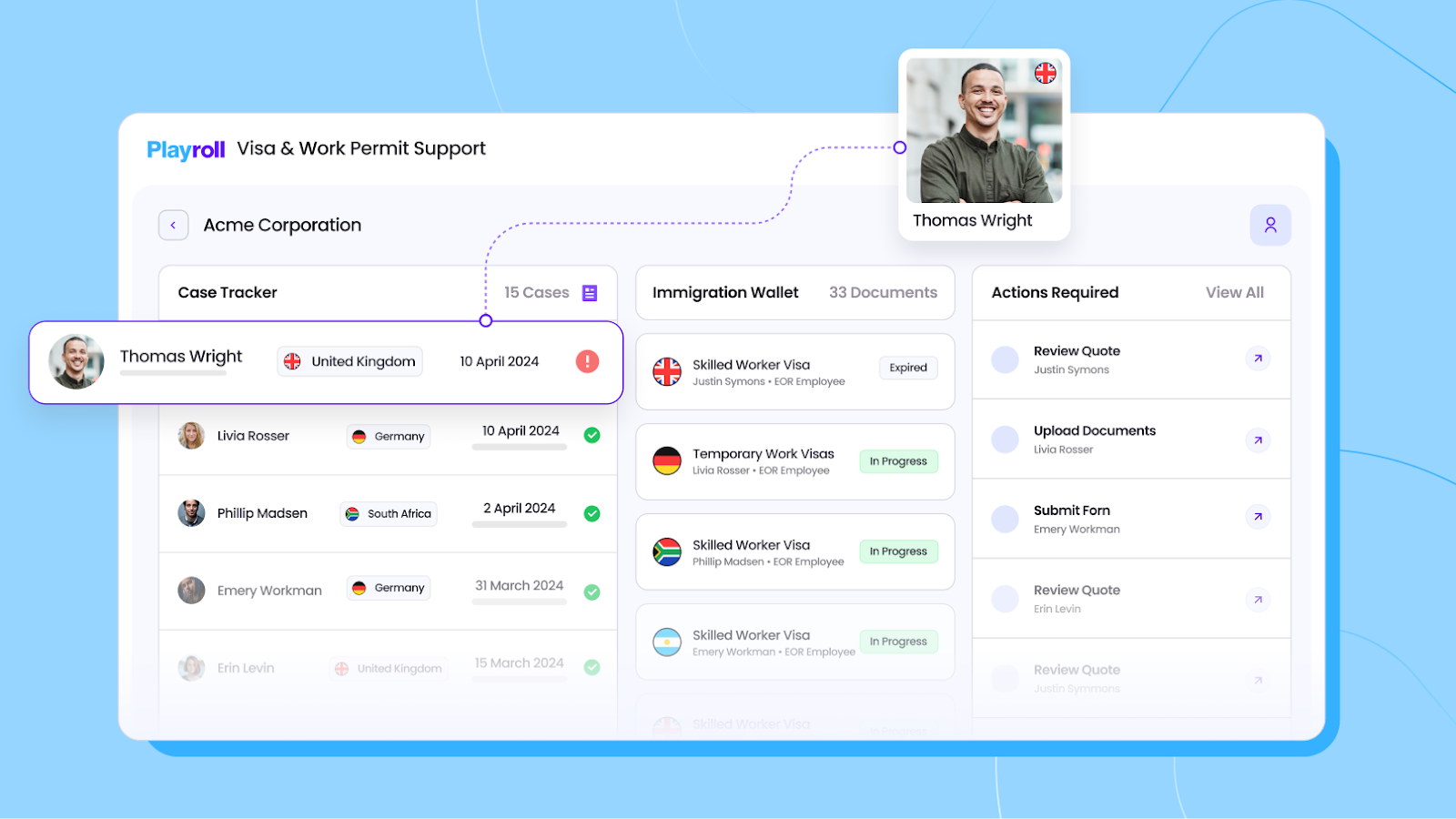
Key Features
- Global Coverage: Manage payroll and benefits in 180+ countries with full compliance wherever your team members are based.
- Competitive Pricing: Use our full EOR services from $399 per employee per month or payroll software for just $2.07 per employee per month.
- Dedicated Employee & Employer Support: Personalized support from dedicated teams for both employers and employees, plus .
- In-House Compliance Expertise: In-house legal, HR, and finance experts to navigate complex international labor laws and tax regulations.
- Quick Onboarding: Get new hires set up and onboarded quickly and without any hiccups.
What Real Users Think
“Playroll makes it incredibly easy to hire and manage remote employees around the world. The onboarding process is smooth, the platform is intuitive, and the support team is always responsive and helpful. I especially appreciate the transparency around compliance and local labor laws — it gives us peace of mind when expanding into new markets. Playroll feels less like a vendor and more like a trusted partner.”
- Verified G2 User
2. BambooHR: Best for Detailed reporting
BambooHR is an all-in-one HR platform tailored for startups and small businesses that want to streamline employee data management and performance reviews. It’s known for its user-friendly interface and flexibility, which helps teams focus on their people rather than getting bogged down in HR admin.
On the downside, some users find the software doesn’t integrate with all of their existing systems and the customization options for reports are a bit limited.
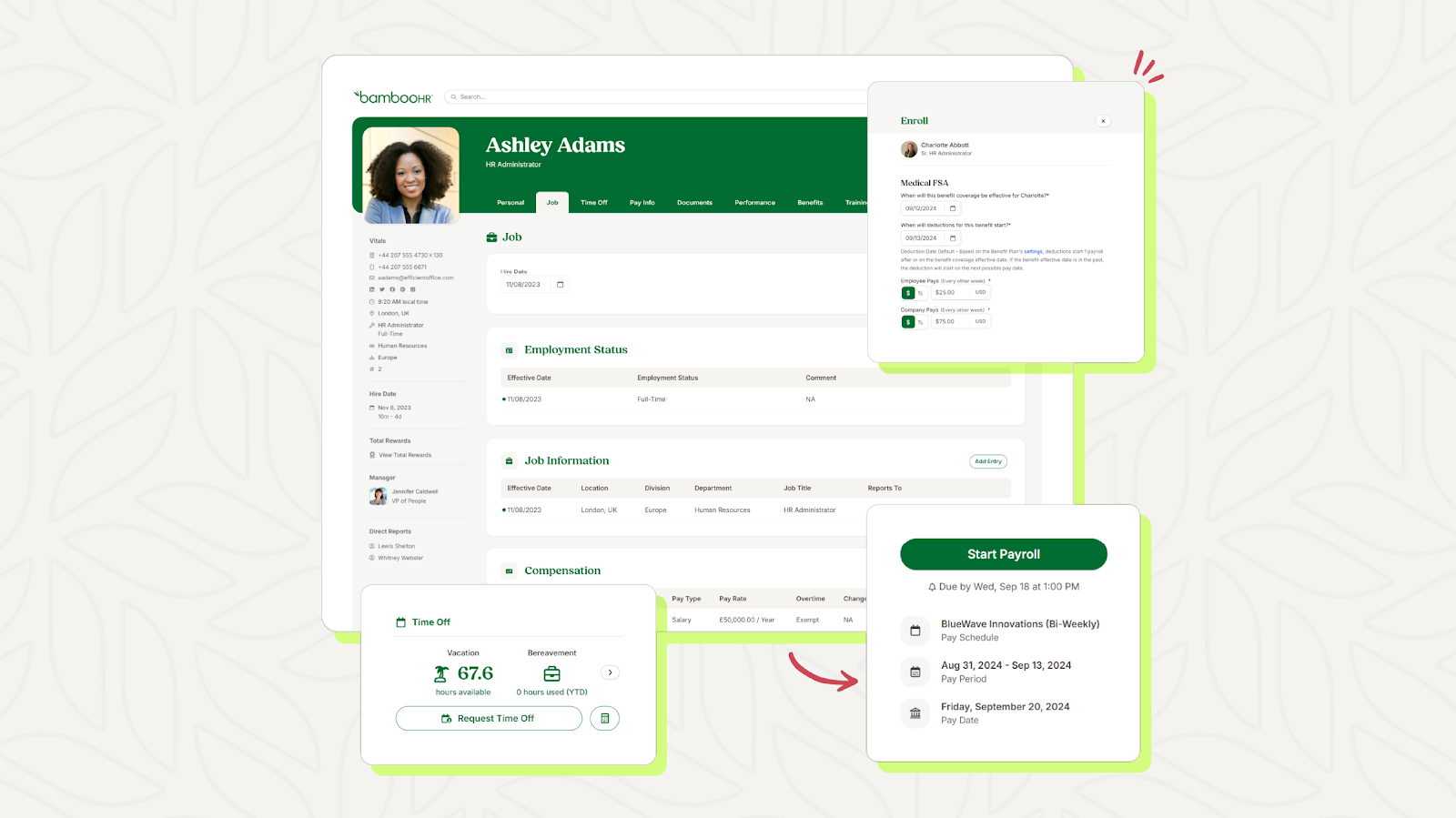
Key Features
- Employee Data Management: Securely store all employee records, including personal and performance data.
- Time-off Tracking: Manage and track PTO and time-off requests.
- Performance Management: Easily conduct reviews and monitor employee growth.
What Real Users Think
We implemented BambooHR in 2019 after transitioning away from a costly PEO, and it has been one of the best decisions we’ve made for our HR operations. The lack of direct integrations with benefits providers means we still rely heavily on manual processes for enrollment and administration.
- Verified G2 User
3. Gusto: Best for Comprehensive HR & Payroll Services
Gusto is a favorite HR platform for small and medium businesses, offering a robust solution for everything from payroll to benefits management. It’s especially well-suited for startups looking for an all-in-one solution, but can be more expensive when it comes to moving to a higher tier with more advanced features.
This could be a problem for businesses that are looking to scale. Some users have also raised complaints about ads for non HR-related products.
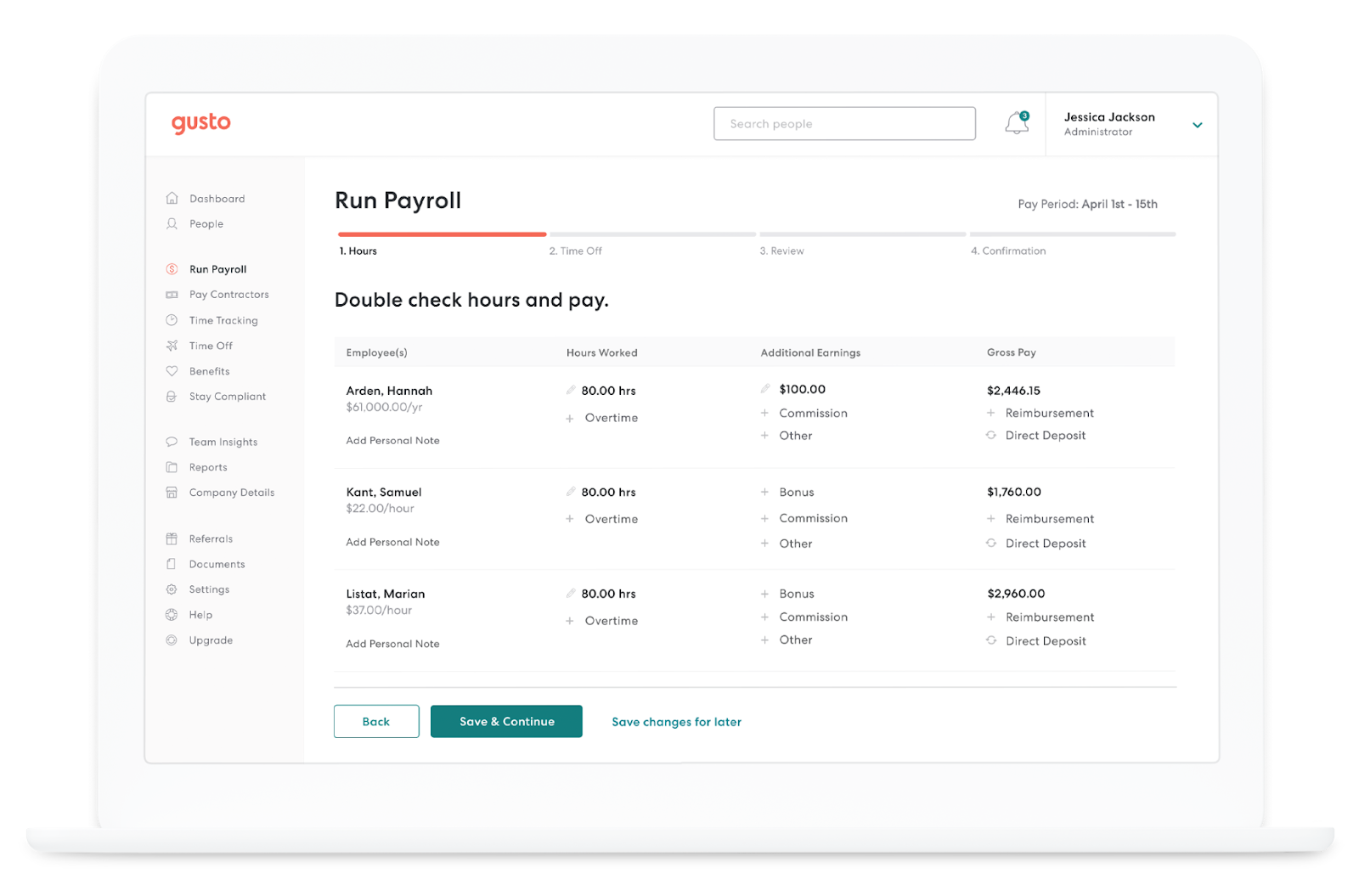
Key Features
- Payroll Processing: Automates payroll, tax filing, and compliance with ease.
- Benefits Management: Manage health insurance, retirement plans, and workers' compensation.
- Employee Self-Service: Employees can view pay stubs, benefits, and time-off requests from their portal.
What Real Users Think
“What I like best about Gusto is how easy it makes payroll and onboarding. The interface is clean and intuitive, and it’s helpful having everything in one place. The biggest downside is that some features feel a bit rigid or limited. Overall, it’s a solid platform, but there’s room for improvement in customization and user support.”
- Verified G2 User
4. Rippling: Best for Multi-Stream Automation
Rippling shines when it comes to automating onboarding and managing employee benefits and is a particularly good choice for businesses looking for all the bells and whistles. With a comprehensive suite of features, Rippling’s platform helps to reduce manual errors and streamline HR workflows.
However, its complexity can be overwhelming for startups or small businesses that are just getting started with HR software.
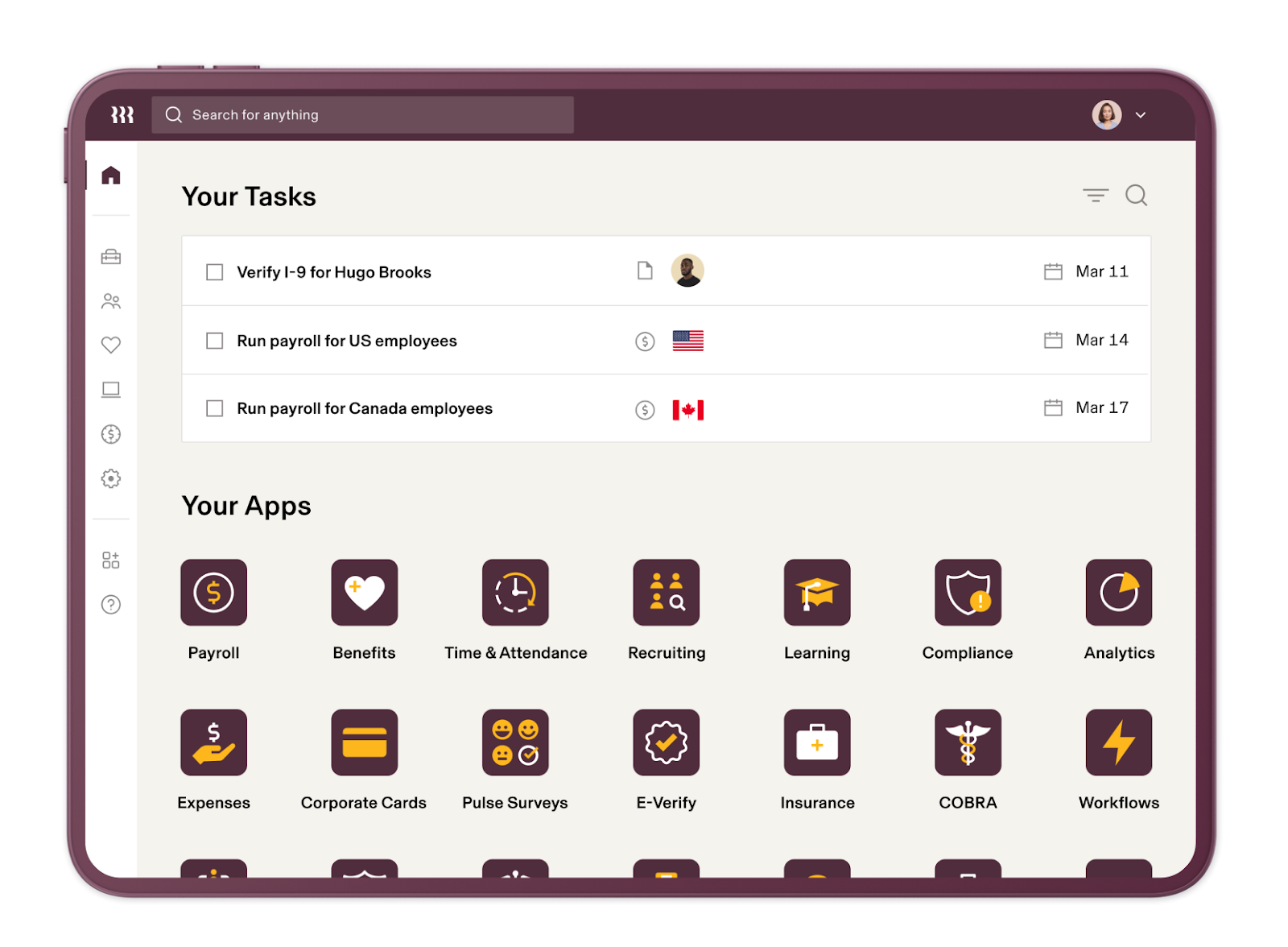
- Automated Onboarding: New hires complete all necessary paperwork before their first day.
- Benefits Management: Handle health insurance, retirement plans, and other employee benefits in one place.
- App Integrations: Seamlessly integrate with a wide variety of third-party apps for a fully connected HR system.
What Real Users Think
“While Rippling is feature-rich, it can feel overwhelming at first, especially for smaller teams or those new to integrated systems. Some advanced features may require extra setup or support.”
- Verified G2 User
5. Zoho People: Best for Affordibility
Zoho People is an HR platform built with small businesses and startups in mind, offering a highly customizable experience to manage everything from employee data to performance tracking. It’s perfect for teams that want an HR solution that fits their unique needs rather than a one-size-fits-all approach.
One thing to keep in mind, though, is that with all its customization options, Zoho People can take a bit more time to set up compared to simpler, more straightforward tools. That being said, some users also find the features a bit basic in comparison to more established softwares.
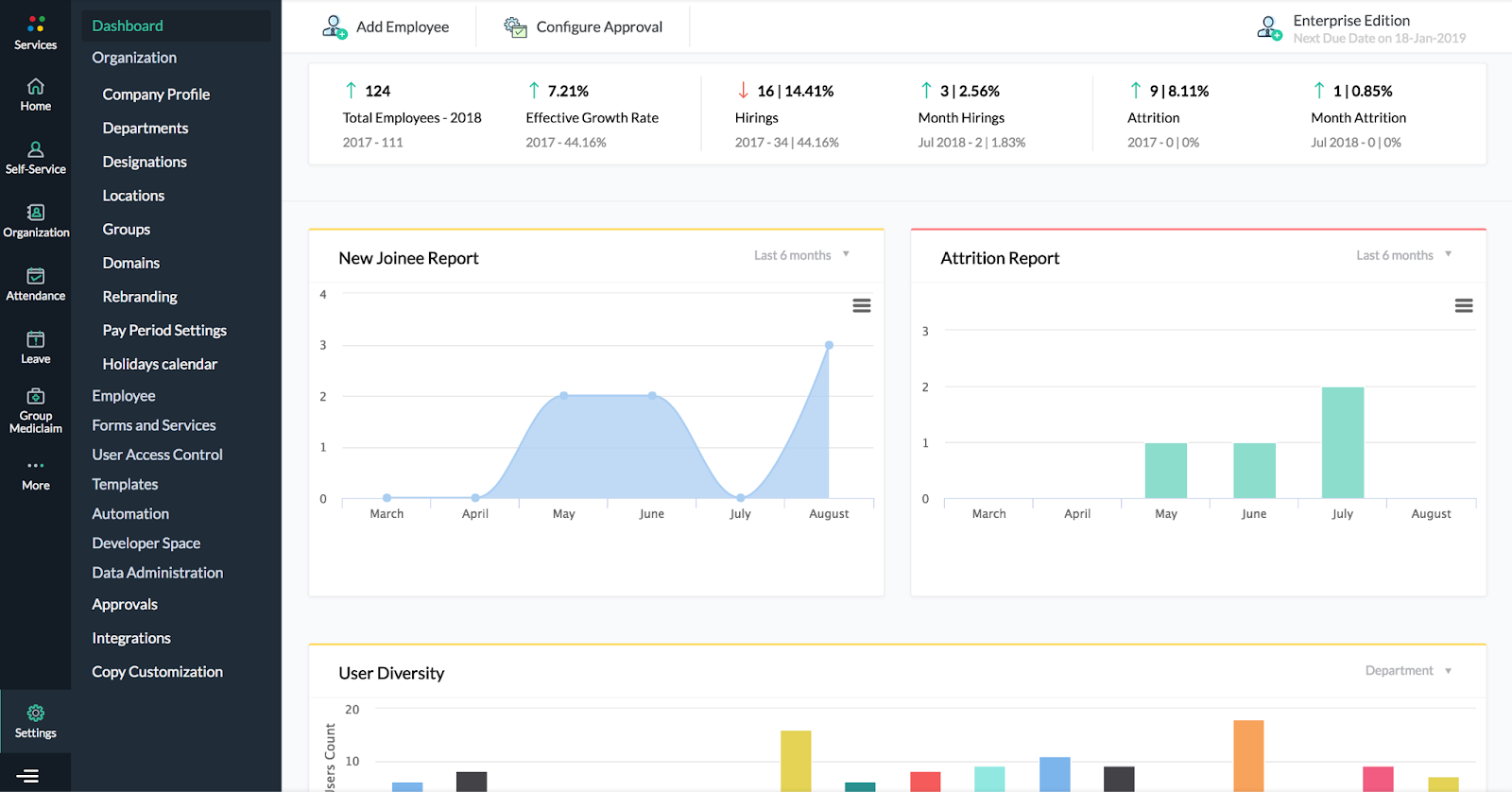
Key Features
- Employee Data Management: Keep all your employee info in one place, and customize fields to capture exactly what matters most to your business.
- Time Tracking & Attendance: Track working hours, overtime, and time off with ease, so you never have to worry about inaccurate records.
- Performance Management: Run performance reviews, set employee goals, and track progress to keep your team engaged and moving forward.
What Real Users Think
Zoho People makes day-to-day HR operations surprisingly simple and organized. From the start, it was clear how easy it is to use. The reporting section could be more flexible — customizing reports sometimes requires more steps than expected. Also, while most core features are strong, a few advanced modules feel a bit underdeveloped compared to other enterprise tools.
- Verified G2 User
6. Kissflow HR Cloud: Best for Automating HR Workflows
Kissflow HR Cloud is a great solution for startups looking to automate their HR workflows and document management. Its no-code approach allows HR managers to easily set up and automate tasks like employee onboarding, leave requests, performance appraisals, and expense approvals.
While it offers lots of customization to suit your needs, it might take a little time to get comfortable with the platform if you’re new to workflow automation and if you’re looking for a software that helps with payroll, this isn’t the one for you.
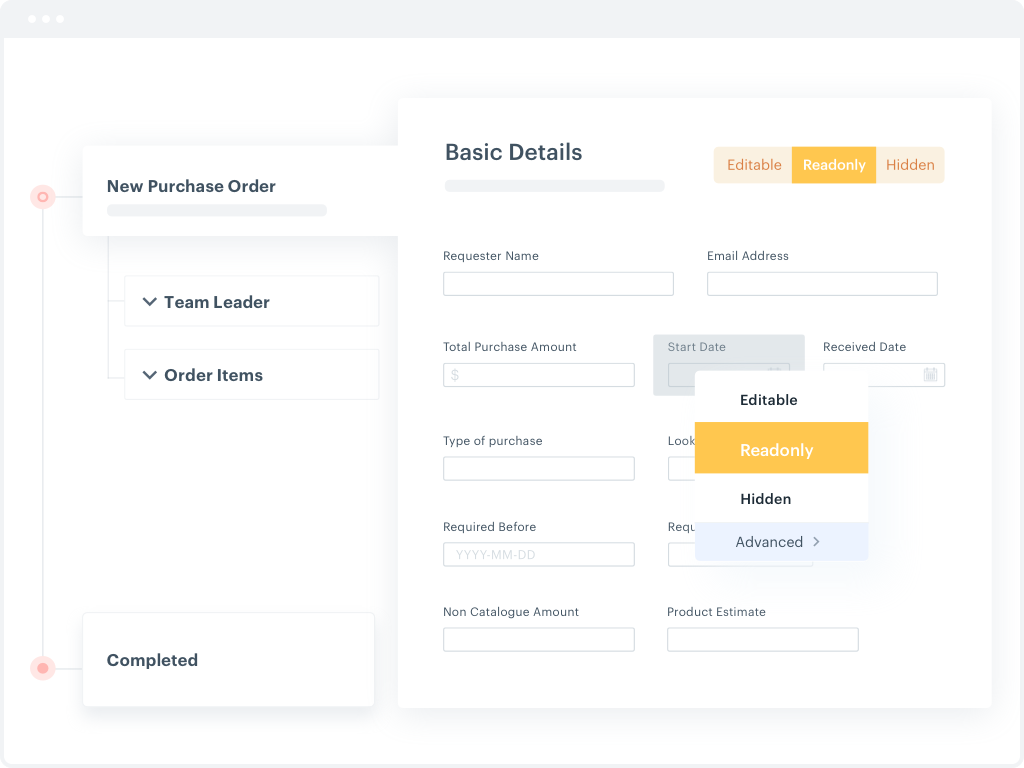
Key Features:
- Automated Workflows: Create custom workflows to streamline HR processes and reduce errors.
- Document Management: Centralize and securely manage HR documents for easy access and organization.
- Employee Self-Service: Allow employees to update personal information and request time off easily.
What Real Users Think:
Kissflow is very easy to create an automated business process that is business ready.
But a more formalised support function and knowledge base would be helpful.
- Verified G2 User
7. Namely: Intuitive Interface for Growing Businesses
Namely offers a comprehensive, user-friendly HR platform designed for growing businesses. It combines HR management, payroll, and performance reviews in one platform. Both employers and employees find the system really easy to use and over the years the company had added a number of additional useful features,
While it’s great for businesses that need an all-in-one HR solution, users have noted some issues getting in touch with human support and delays resolving a variety of issues.
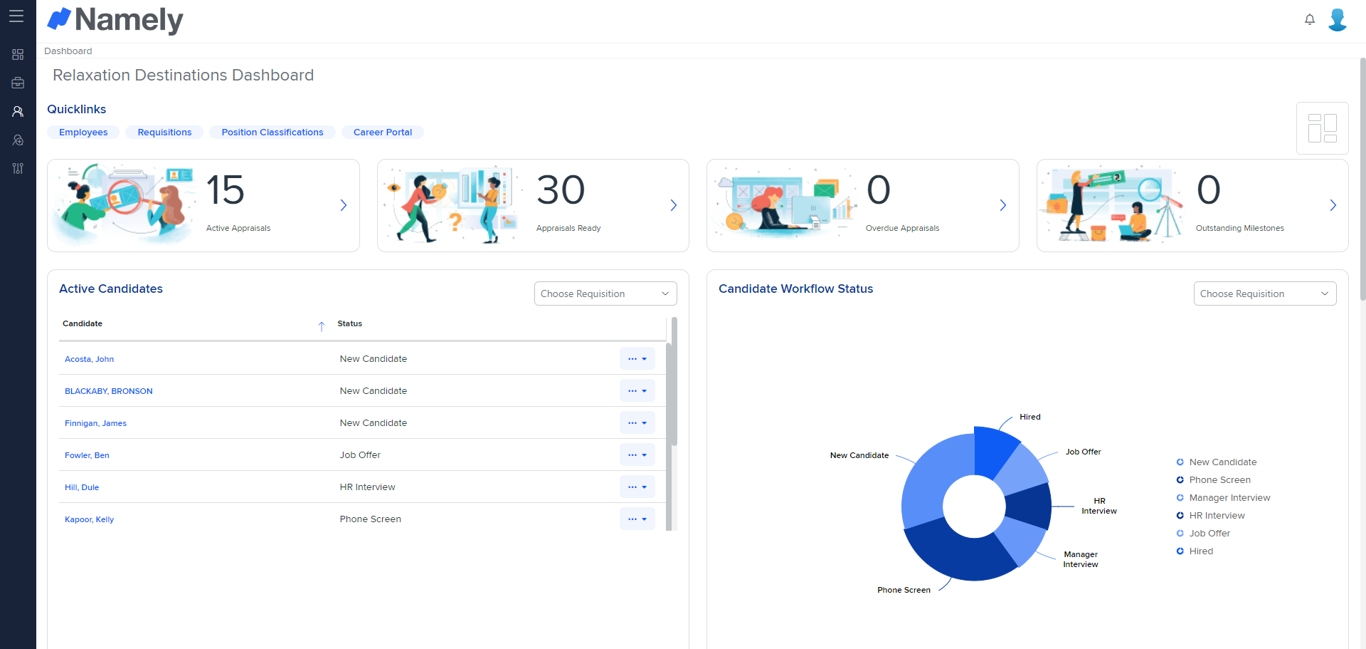
Key Features:
- Core HR Management: Manage employee data and records in one easy-to-use system.
- Payroll Processing: Automate payroll with tax compliance to simplify payroll management.
- Benefits Administration: Manage health insurance, retirement plans, and other benefits.
What Real Users Think:
“The systems are very easy to use for both administrators and employees. The downside about Namely is once past implementation it can take a day or two to resolve day to day issues.”
- Verified G2 User
8. Deputy: Best For Businesses With Shift Workers
Deputy is the go-to solution for businesses with remote or shift workers who need a reliable time and attendance management system. It simplifies scheduling, time tracking, and ensures compliance with labor laws.
However, it can be difficult to fully customize schedules and manage complex shift patterns, which may be a drawback for some businesses with more dynamic needs.
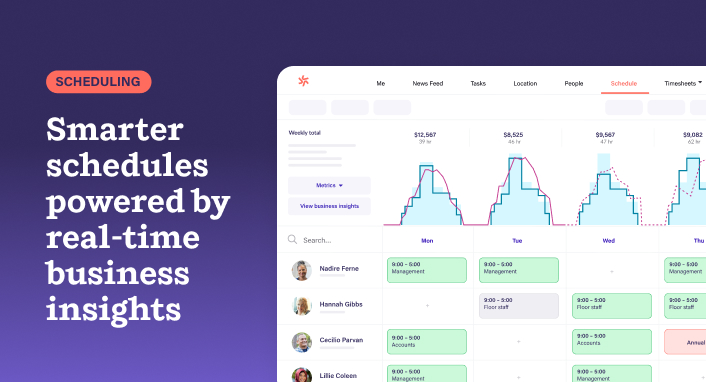
Key Features:
- Time and Attendance Tracking: Time clock software that increases payroll accuracy.
- Scheduling: Create and manage employee schedules, shifts tracked with facial recognition.
- Compliance Management: Ensure adherence to labor laws, including overtime and rest periods.
What Real Users Think:
Deputy makes management of shifts, annual leave, and payroll interface easy. But sometimes the mobile app crashes or logs you out unexpectedly.
- Verified G2 User
9. Breezy HR: Best For Simple Recruitment
Breezy HR is a good option for small businesses that need a modern, efficient applicant tracking system (ATS) to streamline the hiring process. You can use it to easily post jobs, manage candidates, and schedule interviews.
However, its reporting features are relatively basic compared to other platforms, which may limit insights into the hiring process for more data-driven teams. Plus, every additional feature comes with an upcharge.
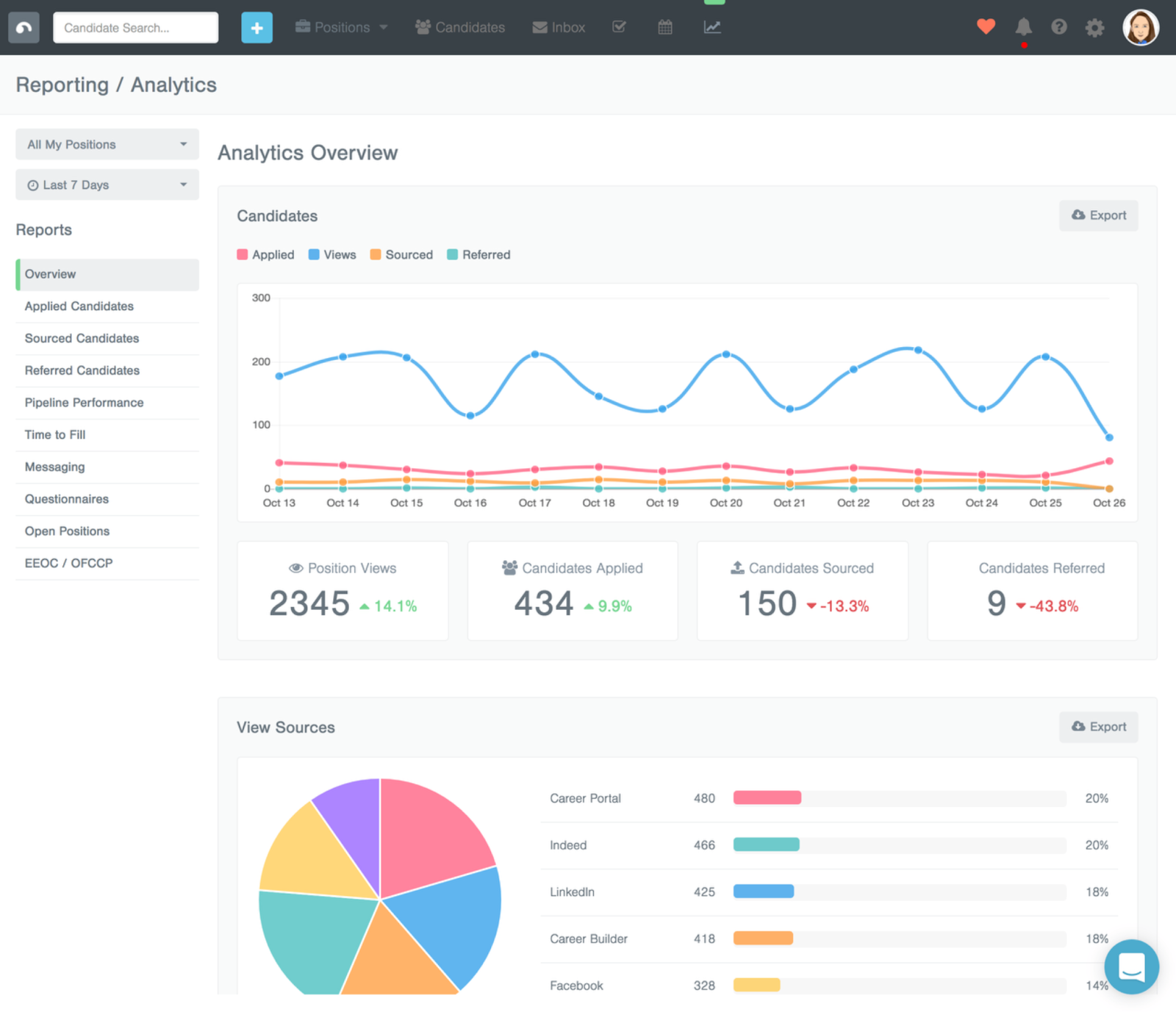
Key Features:
- Job Posting and Distribution: Post customized jobs across multiple job boards.
- Candidate Pipeline Management: Keep track of candidates through all stages of the hiring process.
- Automated Processes: Automate the pre-screening of candidates, sending of emails, interview scheduling, and collecting feedback from your colleagues.
What Real Users Think:
It is such a simple and user-friendly platform. I was able to effectively train my team on the tool quickly and with minimal questions. I don't love that everything is an upcharge. I get it! This is how software companies make money, but as a user it feels discouraging.
- Verified G2 User
10. Workable: Best for Complex Hiring
Workable is another option for startups and small businesses looking for a comprehensive ATS to streamline their recruitment process. Known for its easy-to-use interface, Workable makes posting jobs, managing applicants, and conducting interviews simple and efficient.
That being said, it lacks workflow automation capabilities, doesn’t easily integrate with other systems, and the pricing gets pretty steep the more employees you onboard, even if you don’t use all the available features.
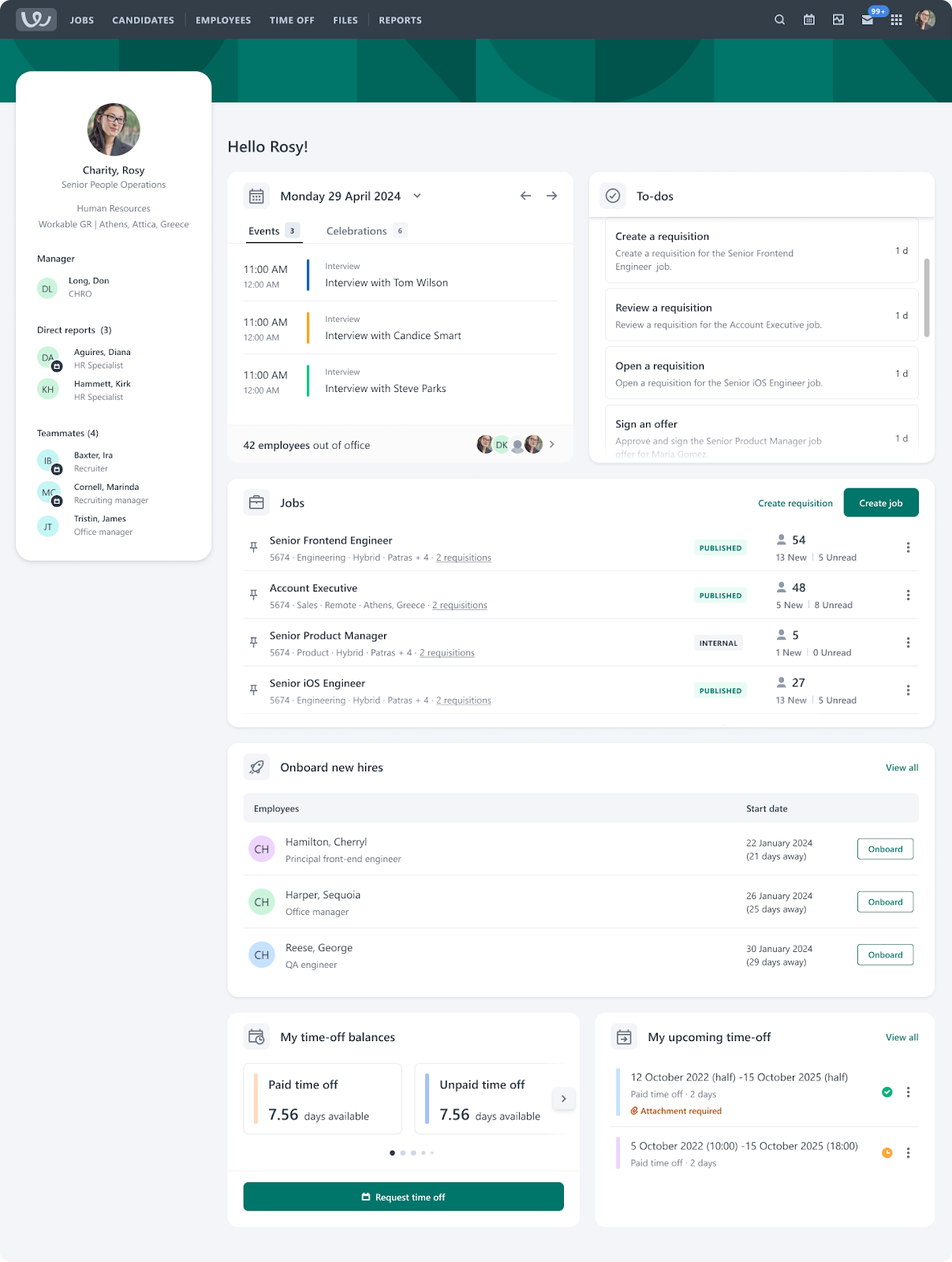
Key Features:
- Job Distribution: Post job openings to over 200 job boards and social media platforms, meaning you’ll have a wide reach of potential candidates.
- AI-Powered Candidate Screening: Use AI HR tools to automatically rank and screen resumes, making it easier to focus on the best candidates.
- Candidate Management: Easily manage candidates through every stage of the hiring process, from application to offer, all within one platform.
What Real Users Think:
The interface is intuitive, the candidate pipeline view is visually clear, and the collaborative hiring features keep our global teams aligned. What I liked least about Workable was the limited customization in some of the reporting features.
- Verified G2 User
Comparison of HR Tools & Solutions
Here’s a quick comparison of the HR platforms mentioned in this article, helping you make an informed decision based on features, pricing, and user feedback.
Note: Pricing may vary based on the number of employees and specific features required. Contact each provider for exact pricing.
How to Choose the Right HR Software for Your Business
The key to picking the right HR software for your small business or startup is knowing what you need. The next step is to find a platform that makes your life easier, not more complicated or admin-intensive.
Here are some expert tips to help you decide which HR software might be the right fit for your team:
1. Identify Your Priorities
Start by asking yourself what your business really needs right now. Are you mostly concerned with completing your payroll runs? Do you need a solid performance review system? Or maybe benefits administration is where you need the most help? Think about the HR functions that will give you the most value.
Make a list of your top HR needs, like:
- Payroll and tax compliance
- Time tracking and attendance
- Performance reviews and employee development
- Employee benefits management
- Hiring and onboarding processes
Once you have that list, you’ll have a much clearer picture of what kind of HR software will work best for you. Focus on the features that matter most to your current stage of growth.
2. Ease of Use
When it comes to HR software, simplicity is key. The last thing you want is a platform that’s difficult to navigate, especially when HR teams and employees need to be able to access it quickly and input information accurately. Look for a platform that feels intuitive and doesn’t require hours of training to figure out.
Make sure the platform:
- Has an easy-to-use interface that your HR team and employees will feel comfortable using.
- Offers mobile app access so employees can view their info, request time off, and track PTO from anywhere.
- Provides onboarding guides and helpful tutorials to get you up and running without a steep learning curve.
The easier it is to use, the more likely your team will embrace it, and that means less time spent troubleshooting and more time focused on growing your business. That being said, simplicity doesn’t mean limited. The platform should have a good range of features, each of which should tick the boxes you need.
3. Scalability
As your business grows, your HR needs will naturally evolve. More employees means more data to manage and extra complexity running payroll every month. The platform you choose should be able to scale with you as you hire more employees or expand into new locations. Look for a solution that can grow alongside you, so you don’t outgrow it in just a year or two. Many HR platforms make onboarding time consuming and unnecessarily difficult so you want to do your due diligence when it comes to making your choice.
When thinking about scalability, consider:
- Flexible pricing plans that allow you to pay for only what you need as your team grows.
- Add-on features like performance tracking or recruitment tools that you can enable when you're ready to expand your HR processes.
- Multi-location support if you’re planning to hire people in different regions or countries.
4. Customer Support
When you’re running a startup or small business, you know that you and your team need to be agile. If there’s a glitch in your accounting system or a feature you’re not quite sure how to use, you can’t afford to wait weeks for an answer. Make sure that you choose a partner with a strong customer support team.
Look for HR software that:
- Offers 24/5 customer support to help solve any issues quickly, no matter the time zone.
- Provides multiple ways to reach support, like live chat, email, and phone, so you can pick the most convenient option for you.
- Has a knowledge base with helpful articles and tutorials to assist with common problems or questions.
5. Integration with Other Tools
Chances are, you already use a whole host of other tools for your business, whether that’s project management software, accounting tools, or communication platforms like Slack. The last thing you want is for your HR software to operate in a silo, making your processes inefficient and disjointed. Choose a platform that integrates well with the tools you're already using.
Ensure your HR platform integrates with:
- Accounting and payroll software like QuickBooks or Xero to avoid double entry of financial data.
- Project management tools such as Asana or Trello to align your HR processes with day-to-day operations.
- Communication apps like Slack or Microsoft Teams, so HR info is easily accessible without having to switch between apps.
Grow Your Business with a Comprehensive Global HR Platform
Choosing the right HR software isn’t about finding the perfect platform because it doesn’t exist. Focus rather on finding the system that’s the best fit for your business today, and one that will grow with you tomorrow.
A comprehensive global HR platform like Playroll’s offers the flexibility to manage payroll, compliance, and employee benefits across multiple countries, all while being easy to use and cost-effective for small teams. It’s a solution that grows with you, helping you streamline operations and maintain compliance without the need for expensive infrastructure or additional resources.
Ready to get started? Speak to an expert today.
HR Platforms FAQs
Are HR platforms affordable for small businesses?

.png)
Yes! Many HR platforms, including Playroll, Gusto and Zoho People, offer affordable pricing plans that fit the budget of small businesses and startups.
What features should I look for in an HR platform?

.png)
Focus on features like payroll processing, benefits management, performance tracking, and employee data storage. Look for platforms with mobile apps and integration capabilities.
How can upgrading your HR platform increase business?

.png)
Upgrading to an all-in-one HR platform can help automate tasks, reduce errors, and ensure compliance, freeing up time and resources to focus on growing your business.
What are the different types of HR software?

.png)
HR software solutions include HRIS (Human Resource Information Systems), payroll management tools, performance management software, and employee engagement platforms.
.svg)
.svg)
.svg)

.svg)
.svg)




.png)

.png)

.svg)


.png)












.svg)